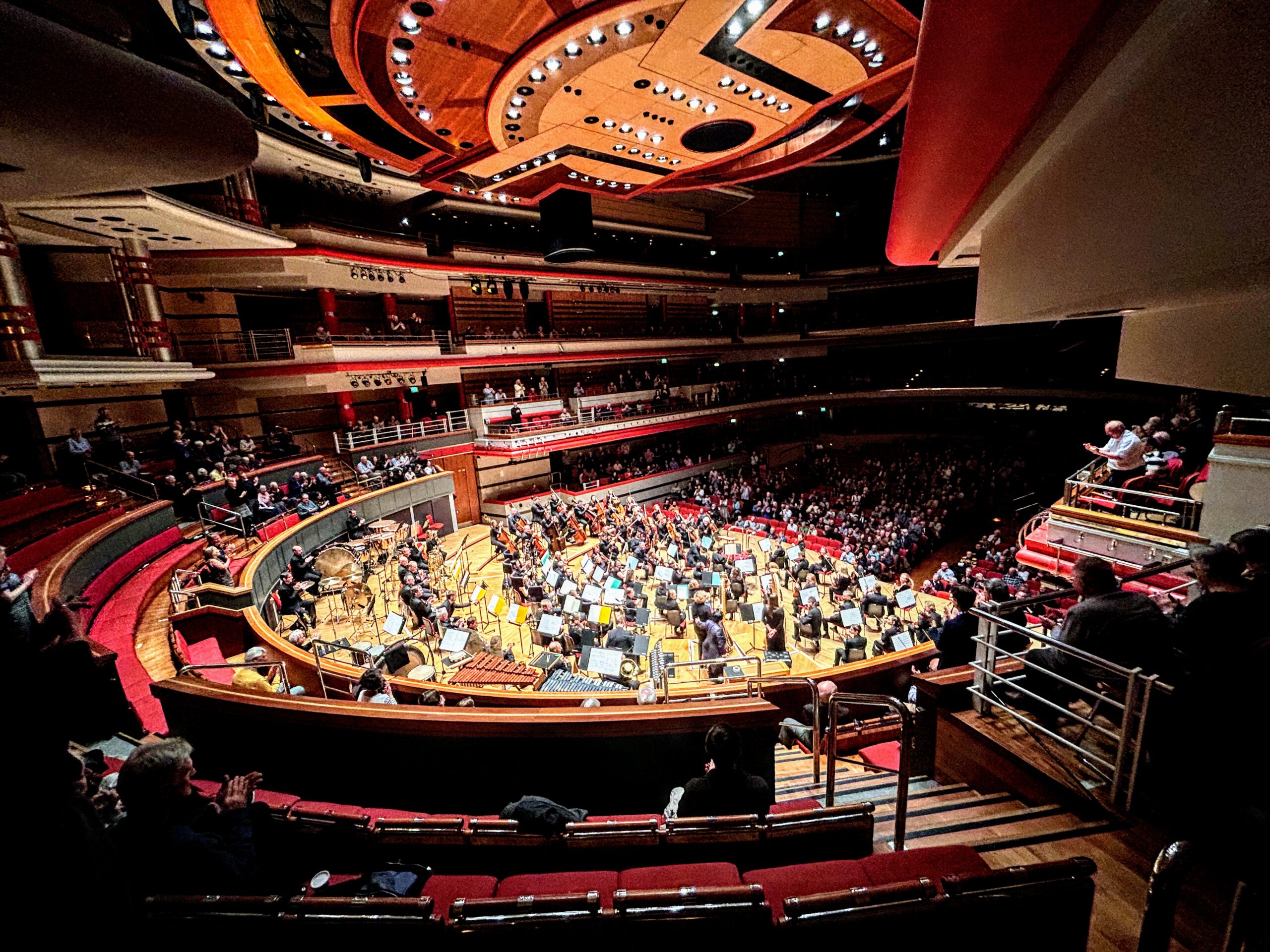The CBSO’s experiments with concert experiences have done more than simply start a debate about mobile phones in concert auditoriums.
They’ve exposed the anachronistic view the classical music industry has of itself, illustrating not only the need for change but the resistance that might prevent it.
Estimated reading time: 13 minutes
Back when I was an undergraduate, arts admin was pitched as a viable and possibly even attractive career choice for those of us for whom playing professionally didn’t attract or wasn’t an option. Being amongst music without actually making it, was an acceptable alternative to making good on the degree.
A friend of old acted as the advance party, securing an internship with an orchestra in Worcestershire before assuming the role of office administrator for the Orchestra of the Age of Enlightenment back when now outgoing BBC Proms Director David Pickard was running the fledgling band.
My friend encouraged me to follow the same route with the English Symphony Orchestra. I traded on her name, securing a job on the day I spent on work experience. It appeared there weren’t many people interested in working with orchestras. I felt like Christmas had come early.
Who’d be an arts manager now?
Thirty years later, with a good twenty years of observing the industry from the comfortable position of working in other industries as well as a range of reasonably comfortable seats in the auditorium, I’m not entirely clear why anyone would want to work in it. The salaries have improved, the working conditions too. But the challenge is greater and the instant feedback from armchair critics, journalists, fans, and those prone to respond to dog whistles must surely make the task at best thankless and at worst utterly demoralising.
Dwindling subsidies and reluctant sponsors have tightened budgets. Vocal minorities object to even the most pragmatic of changes, let alone anything innovative. Some arts professionals are wise and robust, and most have long since accepted that maintaining convention is the best route if only to maintain a quiet life. Who’d work in the arts now?
This question has come the fore amid the evolving discussion following the CBSO’s experiment with concert experiences. The intention to experiment was announced 6 months ago, but CBSO’s plans only became a talking point when tenor Ian Bostridge stopped his performance mid-work to ask audience members to stop filming. That was a few weeks ago. Directly after the conversation was being had amongst the industry. Now the story has made it to Radio 4’s Today (thanks to some vociferous short-sighted wailing amongst classical music commentators) the discussion is in the mainstream, where arguably the most damage to classical music’s image will be done amongst potential new audience members. Classical’s distinctiveness (or eccentricities) are now being highlighted to a non-classical audience – one that isn’t as invested in the product as the core, existing and largely conservative audience. And that’s problem because its creating another barrier.
How does someone outside the classical music bubble interpret this?
I showed my ‘Thoroughly Good Test Audience Member’ one example of a performer’s response to the phone/filming debate currently raging online. Lorna, 50-something, is open to all music, has attended classical events at my invitation, fan of Steps, Take That and sundry other pop acts.

Lorna joined me at the Through the Noise launch night last year, where she asked me about Anna Lapwood who’d she’d discovered on Instagram. It was video of Anna in performance which had raised Lorna’s awareness sufficiently to ask me about her. Lorna is a candid individual. Intelligent. Open minded. Responsive to challenge. Was she less inclined or more inclined to attend a classical based on the view expressed by the performer I shared with her, I asked.
“I literally skim read it and thought what an entitled so and so,” said Lorna in a Whats App message. “Why are classical music/concerts any different to pop/rock? If the artist asks at the beginning or in the programme not to record then don’t. Also if they don’t, no need to be a dick and record the whole thing. It’s recording clips, for memories, for your friends. But their language is ridiculous and drives me and those like me away. Smacks of superiority and snobbery. Horrific.”
Lorna’s response reminded me of a marketing director’s irretrievable frustration negotiating radio appearances for classical artists. Tom (not his real name) found it difficult to understand why classical artists were so unwilling to make themselves available for appearances compared to pop artists. “Everything demands so much negotiation,” he moaned, “they seem so particular, so fussy. I’m here to help get them promotion. I can see they’re talented. But why are they are so resistant to doing anything above a studio interview when so many of their pop peers are game for anything?”
‘They seem so particular, so fussy’
At the time – five years ago – I judged Tom for not being open minded enough to see that some musical types because of their training and their artistic purpose and goals had a different outlook: they saw the performance (their actions) speaking louder than any words they could speak. That’s what they had responded to as listeners, and that’s quite understandably I explained to Tom is what they expected others to judge them by. “They’re not accustomed to promoting themselves. They’re conduits for the ‘genius’ in the music. They’re not performing monkeys.” “They’re impossible,” was his reply.
I felt caught between two worlds. On the one hand, understanding and sympathising with those who had consistently delivered meaning to me, at the same time as acknowledging what this would-be disrupting medium – the radio station – sought to achieve, spreading the word about the thing I felt I owed so much to to a wider non-classical audience. It didn’t help that the workplace was toxic, with powerful individuals suspicious of anyone who articulated vision, passion or had a CV that included public service broadcasting.
I gave up eventually, and in the process of doing so was made to feel as though I was the problem both for classical music’s future and my own employment.
Perfectionism drives elite performance but entrenches resistance to change
At the heart of all of this is the performer. They are the ones who do the heavy lifting in terms of creating the experiences. We applaud the positive attributes of their perfectionist trait. Yet, the negative attributes of perfectionism fuels aversion to risk and allows resistance to change in whatever form to grow.
I have no overwhelming need nor desire to film snippets of a concert. What I’m more interested in is why so many people I admire are so vehemently opposed to even the idea of it when what lies at the heart of the music they perform is deeper understanding and ultimately growth. The history of music is fuelled by growth. Growth insists on challenge. And yet those who are the mediators resist present-day change on the basis that something might be irretrievably lost.
There is baked into this perspective – as articulated by the performer who Lorna responded to in our Whats App exchange – a desperate need on the part of some performers to underline their difference from the rest of the music industry. This is partly to do with the time and effort they’ve put into training. Yet, in explaining their difference, they’re inadvertently elevating themselves and their art over their peers in other genres who themselves manifest equally meaningful experiences for others. Some classical artists bemoan not being appreciated by a much wider audience, but want to be seen as different, special and possibly even as exclusive. That paradoxical view is at the heart of the resistance that consistently prevents change.
I believe that paradoxical view permeates all aspects of arts management. Collusion perpetuates this elevated view meaning that any proposed change large or small brings about a disproportionate outcry. It’s the outcry that results in lesser experienced arts leaders from hesitating or perhaps even backtracking.
The irony is that apart from the considerably broader audience base and comparatively more commercially viable product, the only difference between you and Taylor Swift is that she’s amplified and classical’s not. It’s just music.
Mainstream coverage of the story only perpetuated classical music’s image problem
In gaining coverage on Radio 4’s Today, what started out as an experiment and which in reality at the CBSO concert last week amounted to absolutely no disruption at all, has turned into classical music perpetuating the image of itself as being different from other musical genres. Those inside the bubble sympathise with the position because they’ve been part of the bubble all of their lives as a result of education, professional engagement, and as consumers. Those outside of it hear the difference, superiority, and resistance. There’s fear there too. A complete unwillingness to accept that different audiences have different experiences.
To confront their own assumption and accept that not every mobile phone-wielding young person (which is in itself is a fairly reductive view to adopt of the next generation of potential consumers) is an impossible ask. Newcomers are unlikely to want to come to a concert of Bruckner 9, especially if the gatekeepers keep banging on about how much better it is to put their phones down and keep focused for however long the performance goes on for.
Wider coverage of the story hasn’t asserted classical music’s position, it’s only perpetuated the problem it faces, by reinforcing the idea it thinks itself as special, different, above the cultural norms and that it expects everyone else to bend to it. That’s a clique.

Classical feels in peril. That’s why many of the voices who talk about it respond defensively and defiantly. In some respects it is in peril – funding cuts and the greater emphasis on fundraising means it’s far more susceptible to market forces without the relative comfort blanket of public funding. Performers and planners fear their artistic integrity being chipped away at.
Disconnect between performers and management
But what this latest story has also exposed is how there’s a disconnect between some of those on stage and some of those behind the scenes.
Performers want to perform to an audience, but how is that audience made aware of what’s going on? Do people really just assume that if it’s in a brochure or on a website tickets will miraculously sell themselves of their own accord? Are performers, commentators and current subscribers aware of the change in purchase habits? The need to pay close attention to managing the experiences of first-time bookers so that they turn into returners? What strategies would performers put in place to realise those opportunities?
A few months ago, I recall seeing an exchange between one CEO and a reasonably high-profile musician who is appearing at major festivals this summer, revealing just this divide. The musician was dismissive of marketing materials which appeared not to give prominence to the new music they were playing in a concert. This to them seemed like a missed opportunity. The response from the CEO was along the lines of the more unrecognisable names that dominate a piece of marketing the less likely core subscribers will buy a ticket – lead on the familiar and they’ll make the purchase. The exchange was unpleasant and disrespectful on one side; the CEO was characteristically calm and matter-of-fact.
It serves to illustrate the point I’m making: there’s a disconnect and that’s been highlighted once again in the polarising views on mobile phones in the auditorium. The only difference here is that the ‘debate’ such as it is has been a whole lot more heated.
How workplace change management might inform us
In John Kotter’s eight-step model for a roadmap for successful change, the first step is to establish a sense of urgency for the change to be implemented. This urgency is about securing 75% of managers in the workplace’s acceptance that maintaining the status quo is more dangerous than launching into the unknown.

Step 2 is to form a powerful coalition of people with power, expertise, credibility, proven leadership and trust. The remaining steps are of course important, but as long as the narrative about classical music remains the same, we’re unlikely to move from Step 1 for a good long time.
Recently I spoke to an artistic planner who shared their ideas for future concerts. They asked me what I thought about the ideas. Were they likely to piss everyone off? Would these ideas piss somebody like me off? Were these ideas likely to break classical music? The answer was an emphatic no followed up with a discussion about who was doing change well at this moment in time.
Arts leaders need to be fearless and determined
We both agreed that Radio 3’s schedule changes were a case in point of uncomfortable change being successfully introduced by a fearless determined leader who no doubt was aware of the detractors before the final schedule was approved but who resolved to ignore them so that change stood a chance of being implemented.
A few months down the line that schedule change is bedding in and the sky hasn’t fallen in. I’m still not listening to Radio 3, truth be told, but then its not for me I don’t think. But as an example of what’s feared and what’s necessary, this seemed pertinent.
For some in the industry there’s a growing sense that change is necessary, underpinned by increasing numbers of studies revealing Gen Z consumption of classical. This is not change to remove the existing core audience, but an opportunity to capitalise on an emerging audience.
We’re at the Disruption stage of Kubler-Ross’s Change Curve
Yet the narrative that seems to dominate is one of resistance, specifically anger and frustration. This is reflected in stage two (Disruption) of the Kubler-Ross Change Curve, where those who have acquired high levels of expertise as a result of things being done in a particular way for a long time fear feeling undermined by the change. Expressions of anger and frustration follow.

There are some already in the next phase of the change curve – acceptance – though arguably the majority will remain in the disruption state because this is unmanaged change not managed.
The elitism is now impossible to ignore
I have shifted my view on the need for change over a short space of time this year. I was someone who wanted to preserve convention at all costs. I feared the constant shifting of the Proms for example. I didn’t like people applauding in between movements. I found the use of mobile phones in concerts – even for digital programmes – concerning. I dismissed any notion of elitism in classical music with the same vigour as anyone who said to me that classical had an image problem.
But my thinking shifted when I went to the US at the beginning of the year. I saw what concert experiences cost there and realised what advantages we still have in the UK even with a slashing of public funding. I saw a jaw-dropping lack of access and inclusion. After that, I experienced first hand the elitism in classical music writing which many of my peers have commented on themselves and I had previously dismissed. And most recently with this ongoing discussion about filming in concerts, I’ve seen positions adopted by some vocal individuals intent on limiting innovation.
The burning platform
The elitism is present and its difficult to ignore, meaning the change that some are already trying to implement is to be welcomed if for no other reason it encourages more innovative thinking. I’m consistently energised by thinking “What if” about a given subject. The answers aren’t necessarily the solutions, they’re simply the necessary start for growth – more questions, more what ifs, more experiments. Why aren’t more people doing this?
The history of music is dominated by creative individuals who were motivated to grow and develop not just themselves, but their and others’ creative output. Yet at the moment, there are those in the music industry who fear the very characteristic that has resulted in so much music an emerging audience is discovering. Now is the time to remove the rules and dismantle the clique. If we don’t we’re just a laughing stock.


